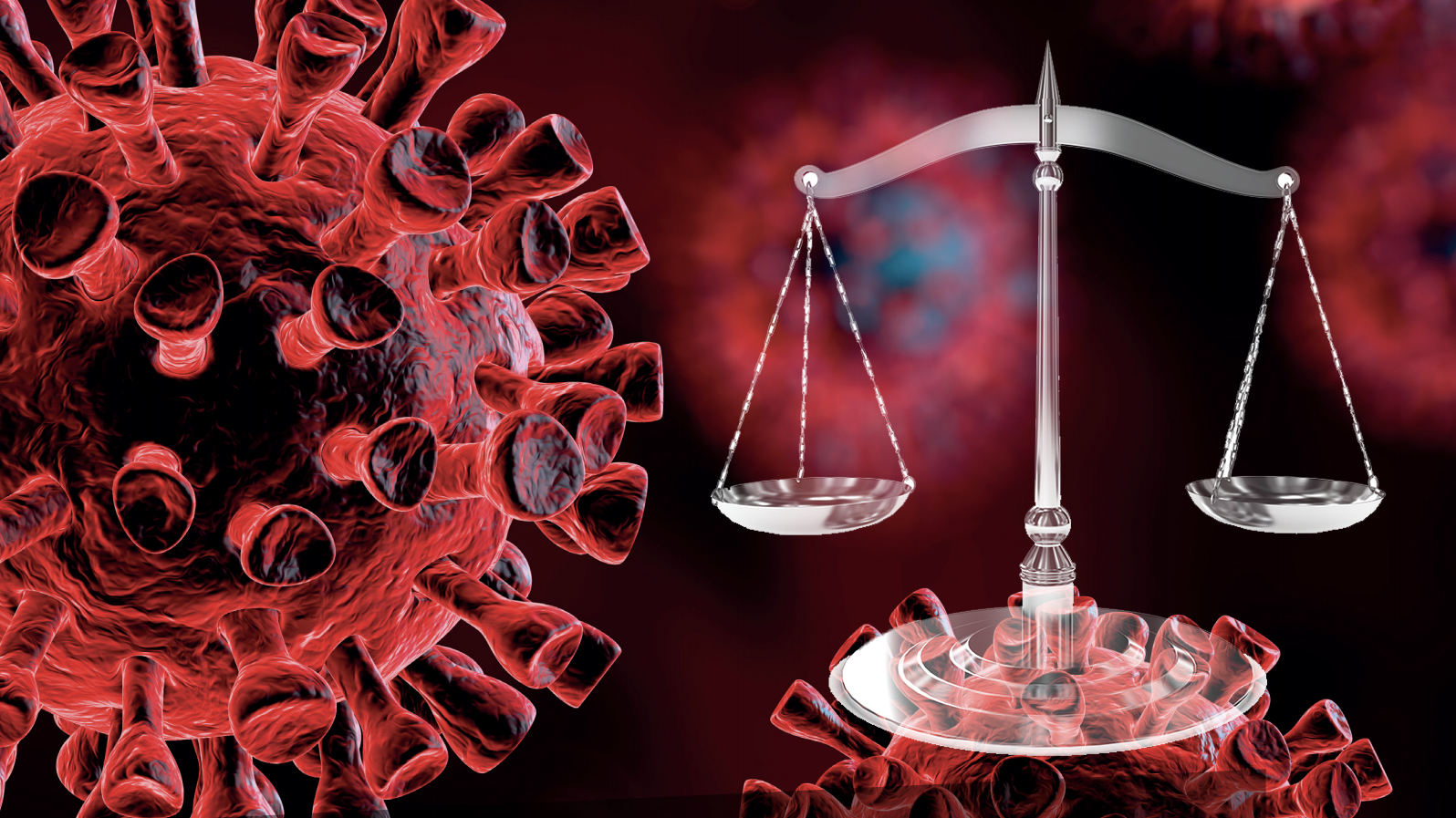
The social and economic changes due to the COVID-19 crisis are affecting the business and practice of law. In federal district court, we have seen a slowdown in court activity, but not in case filings. In this blog post, we investigate situations in which COVID-19 social and economic changes may be the driving forces behind new case filings.
Here is a summary of the trends that we’ve observed so far:
Methodology
Lex Machina is tracking new litigation and analyzing the substance of claims that assert a significant impact by the coronavirus health crisis or related societal changes. Practitioners are predicting an uptick in new cases with complaints citing the COVID-19 crisis, particularly in certain practice areas. To assess whether this uptick has begun in federal district courts, we searched complaints filed in new cases for nine weeks starting March 1-7, 2020 and ending April 26-May 2, 2020.
Tracking New Cases Citing COVID-19 In The Complaint
As shown in the figure below, cases with complaints citing COVID-19 are increasing weekly, with the largest jump between the weeks of April 12-18 and April 19-25, an increase of 110%. Using the search string “covid OR coronavirus OR pandemic” over complaints in cases filed from March 1, 2020 through May 2, 2020 in the practice aras tracked by in Lex Machina, we found 395 cases. The complaints mention these keywords for various reasons; some merely mention the keywords as part of the current state of events, while others allege claims directly related to the coronavirus health crisis or related societal changes.
The keyword search was conducted over initial complaints filed each week starting March 1-7, 2020 through April 26-May 2, 2020. New cases with complaints matching the COVID-19 search string increased week over week, starting with two cases filed March 1-7 and progressively increasing over the following eight weeks, culminating in 123 cases filed April 26-May 2.
Lex Machina covers the majority of cases filed in federal district court and possesses a comprehensive data set that spans a wide-variety of practice areas. Some cases are not included in these numbers if they are outside the Lex Machina practice areas. To the extent that any relevant dataset is currently being amended, we will note it in our discussion herein.
New Cases With Complaints Citing COVID-19
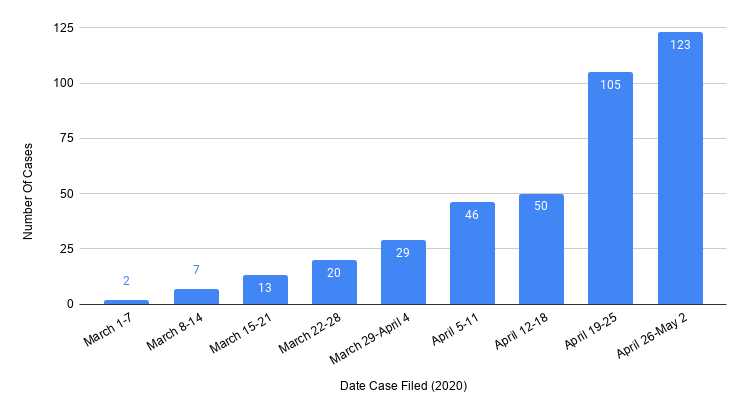
Tracking New Cases Citing COVID-19 By Practice Area
We detected 395 cases from a keyword search over initial complaints in cases filed March 1 through May 2, 2020. When analyzed by practice area, contracts had the most cases filed (168 cases), followed by insurance (104 cases), and then employment (42 cases).
The other practice areas with at least one case include trademark (26 cases), securities (25 cases), consumer protection (15 cases), trade secret (8 cases), copyright (7 cases), patent (7 cases), product liability (5 cases), antitrust (5 cases), ERISA (3 cases), and tax (1 case). As a case may have more than one practice area tag, these numbers exceed 395.
New Cases Citing COVID-19 By Practice Area
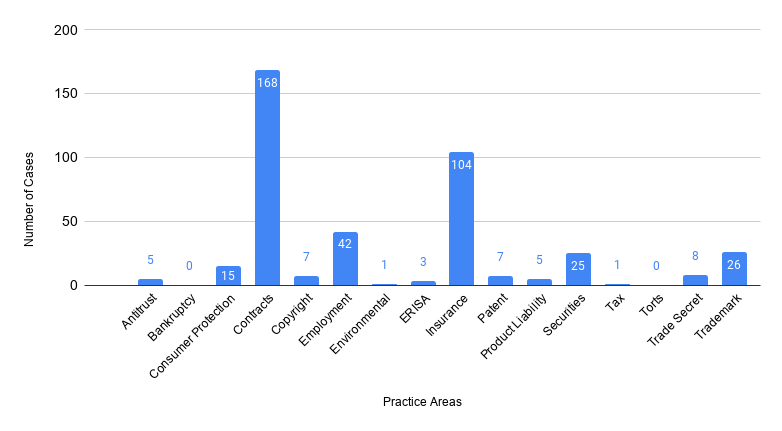
Tracking New Cases Caused By The COVID-19 Crisis
Lex Machina’s team of legal data experts reviewed each of the 395 cases identified by the keyword search and verified whether the case was filed as a direct result of the COVID-19 crisis. We found that a total of 287 cases cited COVID-19 as a reason for filing and 108 merely mentioned a COVID-19 keyword as a preface or procedural recitation.
In order for a case to receive classification as having been “caused by the COVID-19 crisis”, the case must satisfy at least one of the following two criterion:
Cases that merely mention COVID-19 as a preface or recitation were not included, nor were cases with procedural directives referencing COVID-19.
When analyzed by practice area, contracts had the most cases caused by COVID-19 (128 cases), followed by insurance (98 cases), employment (19 cases), securities (15 cases), and consumer protection (12 cases). The other practice areas with at least one case include trademark (11 cases), antitrust (2 cases), copyright (2 cases), product liability (2 cases), patent (1 case), and trade secret (1 case). As a case may have more than one practice area tag, these numbers exceed 287.
New Cases Caused By The COVID-19 Crisis
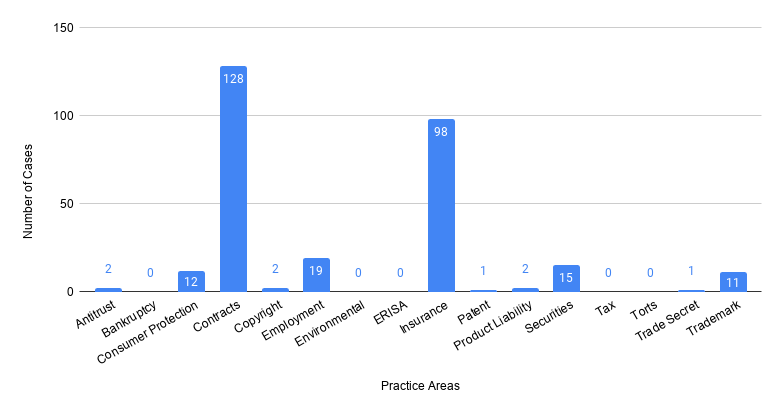
Analyzing COVID-19 Cases By Practice Area
The COVID-19 crisis has consequences for a broad range of social and economic sectors in the United States. Thus far, new case filings reflect this breadth, with 14 of Lex Machina’s 16 practice areas having had at least one new case citing COVID-19.
**Antitrust
**An interesting antitrust case was filed, wherein banks are alleged to have acted anti-competitively by giving preference for loans under the Coronavirus Aid, Relief, and Economic Security Act (“CARES Act”) to existing customers. Other antitrust cases mention COVID-19 to describe the current market or to cite it for scheduling or administrative purposes, but the claims do not arise from the COVID-19 crisis.
**Bankruptcy
**There are no bankruptcy cases recently filed in federal district court that cite the COVID-19 crisis in the complaint. Cases filed as withdrawal of the reference or appeal from Bankruptcy Court proceedings might mention the COVID-19 health crisis in the future, but likely not until after the underlying bankruptcy proceedings driven by current economic pressures are filed.
**Consumer Protection
**Consumer protection cases cite the economic pressures and social complications caused by the COVID-19 crisis. A few Fair Debt Collection Practices Act / Fair Credit Reporting Act allegations cite unwarranted collections and negative credit reporting that prevents consumers from getting much-needed credit during the COVID-19 crisis. Some Telephone Consumer Protection Act cases cite unsolicited calls or faxes misrepresenting health plans or products like hydroxychloroquine that have not been proven to affect the virus. The FTC has filed two COVID-19-related Consumer Protection cases under the FTC Act. The first alleges that the defendant advertised and sold products misrepresenting prevention and reduced risk of COVID-19. The second alleges an FTC Act violation by a defendant doing business as an SBA Loan Program, misrepresenting themselves as a direct lender of government loans to small businesses. Unfortunately, more cases involving federal consumer protection statutes are likely as the public continues to face economic difficulties, and businesses providing financial services respond to the crisis.
**Contracts
**New contracts cases due to COVID-19 show two predominant patterns: cases filed as class actions, and cases seeking refunds for services not provided as a result of the COVID-19 pandemic. Class actions have been filed against almost all airlines, seeking refunds (as opposed to credits) for canceled flights. Students have filed class actions against universities, seeking tuition refunds and claiming that the universities breached their contractual obligations by failing to provide on-campus classes and the educational experience to which they were entitled. Other class actions have been filed against gyms and other monthly subscription businesses, claiming that the subscribers are entitled to a refund of monthly dues charged after the businesses were closed. Class actions have also been filed against ski resorts for failing to refund the value of unused ski passes. Finally, class actions have been filed against sellers of event tickets, such as Ticketmaster, for failing to refund the purchase price of tickets sold for now-cancelled events.
A few interesting cases have been filed seeking declarations regarding the availability of contract avoidance based on the doctrine of impossibility of performance or force majeure clauses — Lex Machina will track these contract avoidance cases and follow defenses that cite COVID-19.
**Copyright
**Unsurprisingly, copyright issues related to COVID-19 have not really appeared in the wake of the pandemic. Most cases mention the pandemic in relation to procedural issues. For example, in one case, the plaintiff acknowledges that the copyright registration paperwork is late due to the pandemic.
**Employment
**A significant number of employment cases involving COVID-19 are expected, as the health crisis has caused unemployment, altered working conditions, and created social complications around the health and safety of workers.
Regarding Fair Labor Standards Act cases, we anticipate there will be an increase in cases for failure to pay minimum wage or overtime, in which the employer suspends operations due to the pandemic and fails to pay wages due to employees.
Federal courts are seeing Family & Medical Leave Act / Americans with Disabilities Act allegations that portray potentially infected employees as disabled, and allegations that employers are failing to provide reasonable accommodation such as protected leave or adequate safety protections for employees with pre-existing conditions. New statutes such as the Families First Coronavirus Act and Emergency Family Medical Leave Act allow claimants to file a claim depending on how the employer handles a request under a leave provision. We are watching for litigation under these statutes.
We expect to see an upward trend in retaliation and/or whistleblower cases involving healthcare professionals. Specifically, we expect more cases wherein employees’ concerns regarding lack of protective gear cause them to face discipline, or when employees contract COVID-19 and are directed to continue working despite their condition.
**Environmental
**Recently filed environmental cases have yet to cite the COVID-19 crisis in their causes of action. In the long term, it is possible that we will see cases alleging violations of federal environmental statutes for COVID-19-related injuries when more scientific data is available to establish environmental risks, such as poor air quality, as a contributing factor to the severity of the COVID-19 virus.
**ERISA
**A few ERISA cases generally mention health or economic issues involving COVID-19. In the longer term, ERISA cases involving delinquent contributions are expected as a fallout of the economic strain on employers, resulting in nonpayment to retirement plans. Furthermore, because the virus has caused fatalities, this could lead to claim denial filings by estate members.
**Insurance
**An influx of new insurance cases mention COVID-19, and nearly all cite a loss of business income due to shutdown orders caused by the pandemic. Businesses seeking coverage for business interruption losses include restaurants (in nearly half of the cases filed to date), dentists and medical service providers, gyms, preschools, retail businesses, and salons. The most commonly named insurers in cases filed in March and April include Sentinel Insurance (10+ cases), Society Insurance (10+ cases), Cincinnati Insurance (9 cases), and Travelers Insurance (5 as defendant and 1 as plaintiff).
The case filed by Travelers is related to state court litigation in Los Angeles Superior Court, where litigator Mark Geragos filed multiple cases against Travelers for denying claims made by law firms and other businesses for compensation based on losses suffered as a consequence of the closure of nonessential businesses. In the federal court case, Travelers seeks a declaratory judgment that Geragos’ insurance policy doesn’t cover business losses resulting from the COVID-19 crisis. Per the complaint filed by Travelers, in order to recover on the policy, Geragos’ firm must have expenses due to “direct physical loss of or damage to property.” A key question in all of this litigation will be what meets the definition of “physical loss or damage” and what coverage obligations are for policies that have no exclusion for a “viral pandemic.” These questions, and many others presented by these cases, may be decided in Multidistrict Litigation currently being considered by the JPML in MDL 2942, In re: COVID-19 Business Interruption Insurance Coverage Litigation.
**Patent
**Patent litigation has not been central to the COVID-19 conversation. One exception is the social backlash against perceived profiteering from the pandemic which caused Labrador, a medical diagnostics company, to repeatedly clarify that their recently filed patent case was not directed to their COVID-19 diagnostic tools (as well as to offer license-free COVID-19 testing one week after the case was filed in federal district court).
One patent case filed in late April demonstrates how the current pandemic is beginning to cause more than simple inconveniences for patent owners and alleged infringers. Smiledirectclub, LLC, claimed patent infringement against Candid, which expressed concern that the defendant might not survive the current economy and may not have the finances to pay any damages that might be awarded.
**Product Liability
**Product liability complaints that cite COVID-19 include two cases that are part of an MDL, In Re: Juul Labs, Inc., Marketing, Sales Practices, and Products Liability Litigation. In a new case filed as part of the pending MDL, plaintiffs allege that “Teenage vaping is rampant in Vermont. Now, with the current COVID-19 pandemic in the United States, teenage vapers are much more susceptible to the Coronavirus than other teenagers due to vaping damage to the lungs of these teenagers.” Also, the Master Complaint in that MDL has been amended to include similar allegations.
Other product liability cases have seen amended complaints with COVID-19 detail added to the factual support for claims or defenses, but our focus for now is cases with initial complaints filed in March and April of 2020.
**Securities
**Extraordinary market conditions caused by the COVID-19 pandemic are cited in a variety of new securities cases alleging federal securities act violations. Cases claiming securities fraud have been filed against a range of defendants such as Norwegian Cruise Lines, Zoom Communications, iAnthus (a Canadian holding company focused on cannabis licensing and investments), and United States Senators Richard Burr (NC), Kelly Loeffler (GA), and James M. Inhofe (OK).
**Tax
**A single tax case cites the CARES Act for changing the effective date of the elimination of net operating loss carrybacks to tax years beginning after December 31, 2017 (2017 Jobs and Tax Cuts Act). This case was not filed in response to the COVID-19 crisis.
**Torts (Medical Malpractice)
**There are currently no torts cases recently filed in federal district court that cite the COVID-19 crisis in the complaint. However, given the projected increase in civilian testing and treatment over the weeks and months to come, we would anticipate a correlated increase in medical malpractice cases that reference COVID-19.
Note: Our current torts module includes detailed data from more than 16,000 medical malpractice cases. At present, it does not include premises liability or motor vehicle-related torts.
**Trade Secret
**Trade secret cases often involve a terminated employment relationship where the employer claims that the employee took trade secrets after the termination. A few cases involve terminations that have taken place due to the pandemic. Additionally, claimants have stated or implied that the pandemic has exacerbated the harm done by the alleged theft of trade secrets. This practice area tends to overlap with contracts cases, and some cases do not touch on the pandemic as part of the trade secret claim but rather as part of the contracts claim(s). As more employment relationships terminate due to the effects of COVID-19, it’s possible that we will see more trade secret misappropriation claims in the future.
**Trademark
**The most well-known trademark cases stemming from the pandemic are cases filed by 3M, alleging that defendants are using its trademarks for 3M brand N95 respirators, masks, and other supplies in order to engage in price gouging. Medline Industries has also taken this approach in its suit against OfficeMart. Several cases mention launches of allegedly infringing goods and services being delayed. Also, comedian Jeff Dunham filed a counterfeiting case that suggests that the defendant’s actions are particularly egregious given the pandemic conditions, and that protected images are being used on safety masks. One case alleges a Lanham Act violation involving sale of COVID-19 test kits.
Our team is following litigation data in a multitude of practice areas and venues, and aims to present meaningful trends and observations on an ongoing basis.
This data was gathered from the Lex Machina platform on May 7, 2020. The Lex Machina platform updates daily and therefore any numbers in this report will change as new cases get added to PACER with new information. This report is meant to provide trends and general research information as of the date of publication.
To learn more about the data behind this article and what Lex Machina has to offer, visit https://lexmachina.com/.







Sign up to receive our stories in your inbox.
Data is changing the speed of business. Investors, Corporations, and Governments are buying new, differentiated data to gain visibility make better decisions. Don't fall behind. Let us help.





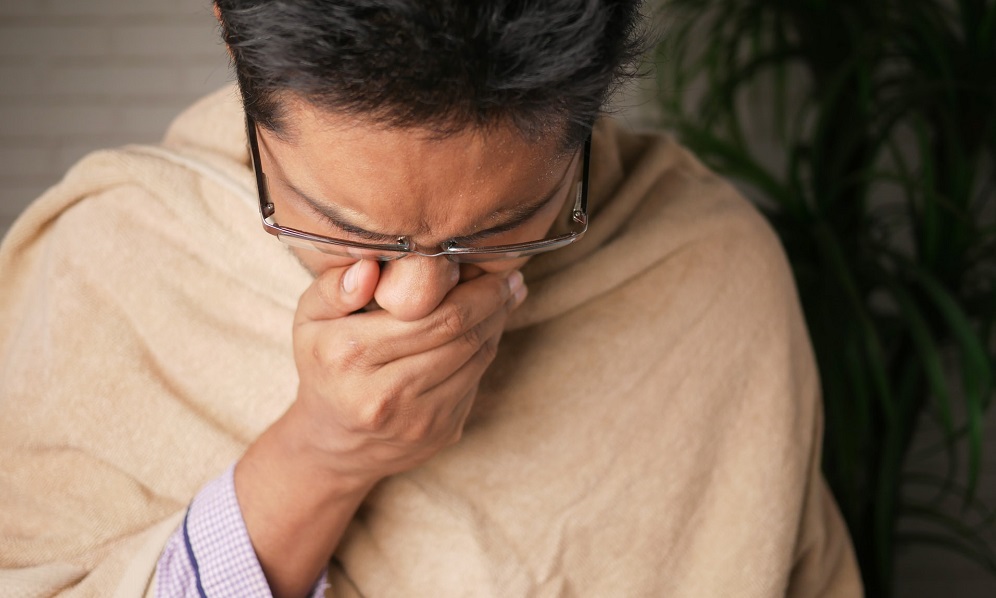







Sign up to receive our stories in your inbox.
Data is changing the speed of business. Investors, Corporations, and Governments are buying new, differentiated data to gain visibility make better decisions. Don't fall behind. Let us help.





